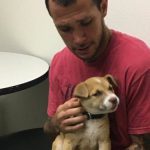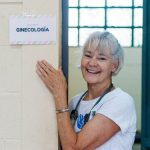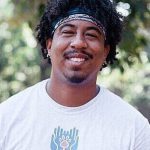
“This Too Shall Pass.” I can still hear my Mother uttering those words whenever I was frustrated and felt like life was throwing curve balls my way. With the whole world being affected by the Covid-19 pandemic, I cannot help but think of her “words of wisdom.” Just a few short weeks ago, life was moving along as expected. Now, with what seems like no warning, all of us are facing a pandemic. While it may feel as if the world is collapsing and we will never recover physically or economically, we will. The world has seen pandemics in the past and we will again in the future. Sadly, many people will suffer and that is difficult to bear. But, in the end we will recover. Because that is what we and all living beings on the planet do. When adversity strikes, we work through it and come out on the other end often with more strength, resolve and wisdom.
The Covid-19 pandemic drives home that we are all connected and that is the premise of the One Health approach to medicine. Whether it involves research of disease transmission or how the human animal bond can create and strengthen health of people, by recognizing our connection to each other, animals and the environment we all share the One Health approach allows us to work together rather than in silos. People & Pets Project was born out of recognizing this connection and is committed to advancing clinical One Health. Or, as we like to say we are taking the One Health concept to the streets by applying it in the clinical setting.
Got your attention? Good! Before we talk further about the Covid-19 pandemic, let’s define One Health. While there are many definitions, I like how the Center for Disease Control and Prevention defines it: One Health is a collaborative, multisectoral, and transdisciplinary approach—working at the local, regional, national, and global levels—with the goal of achieving optimal health outcomes recognizing the interconnection between people, animals, plants, and their shared environment. The take away from the this definition is that a collaborative approach to achieve optimal health outcomes is key.
When I learned that the possible origin of the Coronavirus leading to the Covid-19 pandemic originated at a market selling live animals in Wuhan China[1] , my commitment to the One Health movement was reaffirmed. Understanding our relationship to animals and our environment is paramount to maintaining our own health, especially as the human population is projected to increase from 7.8 billion today to 9.8 billion in 2050 and 11.2 billion in 2100[2]. The way all of us live our life impacts not only our own health, but the health of all the animals and the environment all of us share. And when those actions are detrimental, the effects of our actions eventually come around full circle and impact our own health and well-being. Similar to the concept of the Circle of Life, I like to call this the Circle of Action. Every action we take impacts others and then eventually circles back around to impact ourselves.
To help lessen the severity of the Covid-19 pandemic, we have all been asked to minimize contact with others and stay at home as much as possible. This pause in time is giving many of us an opportunity to look at our own lives and see how we can be healthier for ourselves, those we share our environment with and the planet as a whole. From what we eat, the products we buy, how we travel and how we choose to approach our own health we now have the space to look deeply within and determine where we can make improvements in our lives that can benefit all of us. We are at war with a virus, but even during this battle we can heal ourselves which will ultimately help heal the planet.
“UNDERSTANDING OUR RELATIONSHIP TO ANIMALS AND OUR ENVIRONMENT IS PARAMOUNT TO MAINTAINING OUR OWN HEALTH.”
This space in time also presents CTS with a unique opportunity to reaffirm our commitment to what we are trying to accomplish as an organization because Covid-19 truly is about One Health. Even with the CDC recognizing One Health and its importance, it is still a concept most people, even those working in medicine, cannot grasp. We have been working on our “spiel” for a long time and yet our elevator speech always needs help. Quite humbling to say the least!
Luckily, we have recently received guidance from a marketing professional who has worked with several large corporations to help them develop their marketing plan and even more important their branding. We are taking her advice and comments to heart and with this space in time will be working on strengthening our approach so we can help reach more people and animals in underserved communities receive the healthcare every one of us deserves.
So, with “sheltering in place” recommended and followed, we will spend this time to rework our message and continue working on our goals for 2020 focusing on the healthcare needs of the underserved community. In a perfect world, we would love to see every Federally Qualified Health Center (FQHC) hold a monthly One Health Clinic to better serve their patients and the community as a whole. Why FQHC’s? Because, FQHC’s arecommunity-based organizations that provide comprehensive primary
care and preventive care, including health, oral, and mental health/substance abuse services to persons of all ages, regardless of their ability to pay or health insurance status. FQHCs are also called Community/Migrant Health Centers (C/MHC), Community Health Centers (CHC), and Section 330 Funded Clinics.[3] What we know is people will often help their pet before helping themselves because their pet is their family and offers them a source of comfort in difficult life situations. By offering veterinary services for the pets of these clinic patients we have another opportunity to build trust and strengthen the relationship between patient and healthcare provider leading to better health outcomes for all. We also get to help their animals receive the veterinary care they need too. Lack of available and affordable veterinary care is a significant reason beloved pets end up in animal shelters across our country.
To date, we have met with several local leaders to start a monthly One Health clinic at Daybreak Day Resource Center to provide support services to those affected by homelessness in Macon, GA which is where I now reside. We would like to facilitate and fund this clinic so it can serve as a prototype for other communities to see a One Health Clinic in action. We are also working with other professionals to present the clinical One Health approach at medical conferences and to medical, nursing and physician assistant students so they can learn about Clinical One Health. Finally, while we cannot hold a One Health clinic in Guatemala in 2020, we are already planning a return trip in 2021.
While we may be on pause until Covid-19 is no longer a threat, we look forward to restarting our 2020 goals as soon as all of us can return to our regular activities. We are excited about our plans for the future and hope you are too.
In closing, all of us at CTS want to recognize the people who are continuing to work to provide and protect us during this crisis. Thank you to first responders, doctors, nurses, physician assistants, allied health, pharmacists and all others working on the front lines at all hospitals. Thanks to those of you working at grocery stores, delivery services, trash collectors, utility workers, food banks, journalists, postal workers. Please forgive me if I forgot another sector of our community working hard to ensure we can have the supplies we need. Finally, thank you to all of you doing your part by staying at home, washing your hands and practicing social distancing!
As my dogs now look the other way when I grab their leashes for their fifth walk of the day, I can hear my mother telling me, “This Too Shall Pass.” The question is, will we learn and change our behavior from this?
[1] https://www.sciencedirect.com/science/article/pii/S2090123220300540 accessed March 24, 2020
[2] https://www.un.org/development/desa/publications/world-population-prospects-the-2017-revision.html accessed March 24, 2020
[3] https://en.wikipedia.org/wiki/Federally_Qualified_Health_Center, accessed March 27, 2020




